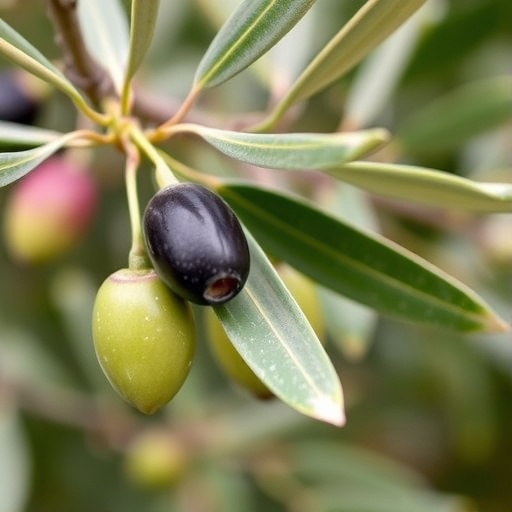Recent scientific advancements have shed light on the intricate relationship between genotype and geographical factors influencing the accumulation of bioactive molecules in olive leaf by-products. A groundbreaking study by Habibi, Riahi, M’Rabet, and colleagues delves into this topic, revealing vital insights that could significantly benefit biotechnological applications. The research highlights how different olive varieties and their growing environments can drastically affect the concentration and activity of these beneficial compounds, thereby opening new avenues for harnessing the natural potential of olive leaves.
Olive trees, revered for their rich cultural and economic significance, are primarily cultivated in the Mediterranean region. The leaves of the olive tree, often overlooked as mere waste, are rich in bioactive compounds known for their health-promoting properties. This research emphasizes the potential of these leaves as a valuable resource in the development of functional foods or nutraceuticals, thus contributing to waste valorization efforts. The findings are particularly timely, given the rising global interest in natural products and sustainable agriculture.
One of the key aspects of this study is the examination of genotype effects on bioactive compound accumulation. Various olive cultivars exhibit distinct profiles of phenolic compounds, flavonoids, and other vital antioxidants. The researchers employed advanced analytical techniques to quantify these compounds, revealing significant variations based on the specific genetic backgrounds of the olive trees. Such genotype-specific results are crucial for breeders and producers aiming to optimize the health benefits associated with olive by-products.
Geographical conditions, such as soil composition, climate, and altitude, also play a pivotal role in determining the bioactivity of olive leaves. The study findings demonstrate that variations in these environmental factors can influence the metabolic pathways involved in the synthesis of bioactive molecules. For instance, regions with higher solar exposure may produce leaves with elevated levels of certain antioxidants. Understanding these geographical influences is essential for farmers looking to maximize the quality and efficacy of their olive leaves for commercial use.
Furthermore, the implications of this research extend beyond just the agricultural sector. The bioactive molecules contained in olive leaves have garnered attention from the pharmaceutical industry due to their potential therapeutic benefits. Compounds like oleuropein and hydroxytyrosol are known for their anti-inflammatory, antimicrobial, and antioxidant properties. The ability to customize the bioactive profile of olive leaf extracts based on genotype and geographical conditions presents a significant opportunity for the development of targeted health products.
In addition to health benefits, the research underscores the economic potential associated with valorizing olive leaf by-products. Currently, a considerable amount of olive leaves is discarded or underutilized, leading to environmental waste. By tapping into the biotechnological applications of these leaves, producers can transform what was once considered by-products into valuable commodities. This shift could contribute significantly to the sustainability of the olive oil industry, promoting a zero-waste ethos.
The researchers employed a multi-faceted approach, combining genetic analysis and bioactivity assays, to provide a comprehensive assessment of the olive leaf compounds. By correlating the data derived from various olive cultivars with their respective geographical contexts, they were able to formulate actionable insights. This innovative methodology highlights the importance of interdisciplinary research in tackling complex agricultural issues.
As the demand for natural, plant-based products continues to surge, this research could expedite the commercial viability of olive leaf extracts. The findings offer a roadmap for farmers, biochemists, and entrepreneurs to work collaboratively towards the sustainable development of olive resources. With growing consumer awareness about health and wellness, there is a ripe market waiting for high-quality products derived from olive leaves.
By shedding light on the interplay between genotype, geographical factors, and bioactive compounds, this study paves the way for future research endeavors aimed at exploring other agricultural by-products. It challenges scientists to explore the biosynthetic pathways in various plants, encouraging an era of discovery that could revolutionize the way we view agricultural waste.
Moreover, the study advocates for responsible cultivation practices to ensure the sustainability of olive farming. As regions face challenges from climate change and resource depletion, understanding the relationships outlined in this research will help producers make informed decisions about cultivar selection and land management.
The successful valorization of olive leaf by-products is not merely an academic pursuit but a necessary step for the future of sustainable agriculture. The current global movements towards reducing waste and seeking eco-friendly products align perfectly with the findings of this research. It emphasizes the urgent need for the agricultural community to rethink its approach to by-products and consider them as valuable resources.
In conclusion, the work of Habibi et al. serves as a beacon of hope for the future of agriculture, biotechnology, and sustainability. The insights into the genotype and geographical influences on bioactive molecules in olive leaves could stimulate innovation and collaboration across various fields. As researchers continue to explore the depths of plant-based compounds, the potential benefits for human health and the environment are immeasurable.
This research represents only the beginning of a larger movement towards utilizing agricultural by-products in novel ways. With continued investigation and interdisciplinary cooperation, the possibilities are endless for enhancing health outcomes and promoting sustainable biotechnological practices.
Subject of Research: The impact of genotype and geographical conditions on bioactive molecules in olive leaf by-products.
Article Title: Genotype and Geographical Effects on Bioactive-Molecules Accumulation and Bioactivity in Olive Leaf By-Products: Implications for Biotechnological Applications.
Article References:
Habibi, E., Riahi, L., M’Rabet, Y. et al. Genotype and Geographical Effects on Bioactive-Molecules Accumulation and Bioactivity in Olive Leaf By-Products: Implications for Biotechnological Applications. Waste Biomass Valor (2025). https://doi.org/10.1007/s12649-025-03402-0
Image Credits: AI Generated
DOI: https://doi.org/10.1007/s12649-025-03402-0
Keywords: Olive leaves, bioactive compounds, genotype effects, geographical influences, waste valorization, sustainable agriculture, health benefits, nutraceuticals, olive oil industry, plant-based products.
Tags: bioactive molecules in olive leavesbiotechnology applications in natural productsflavonoids in olive leavesfunctional foods from olive leavesgenotype influence on bioactive compoundsgeographical factors in olive cultivationMediterranean olive tree cultivationnutraceutical development from olive by-productsolive leaf by-productsphenolic compounds in olive varietiessustainable agriculture practiceswaste valorization in agriculture





